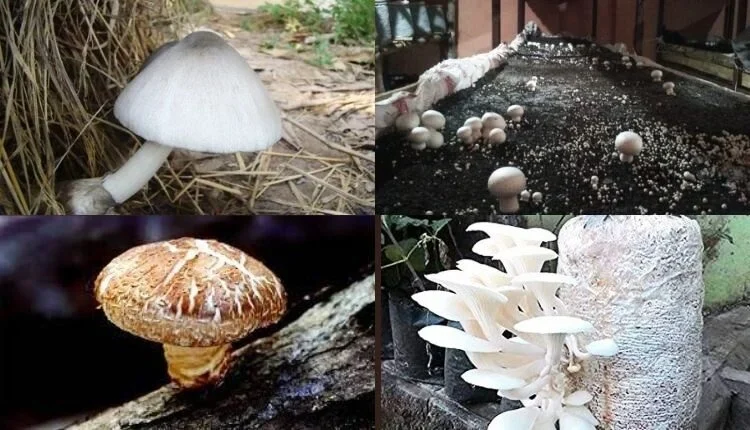Top 5 Mushrooms: Most cultivated Mushrooms in India
Mushroom cultivation effective in increasing the income of small and marginal farmers
The government is promoting mushroom cultivation in a big way. Know about the Top 5 Types of Mushrooms, whose cultivation has become a profitable deal for the farmers.
In the last few years, the interest of farmers has increased towards mushroom cultivation in addition to traditional farming. Mushroom is one such crop, which can be cultivated at low cost and in less space. Earlier, there was lack of information among the farmers regarding mushroom crop, but now the situation has changed.
Farmers of many states of the country are earning good income by cultivating mushroom. Mushroom is cultivated on a commercial scale in Punjab, Haryana, Uttar Pradesh, Maharashtra, Tamil Nadu, Karnataka, Telangana, Himachal Pradesh and Uttarakhand. Experts believe that mushroom, which can be prepared in less space, less time and less cost, is a high value agricultural crop. It is expensive, so profit is good. This can prove to be effective in increasing the income of small and marginal farmers. Farmers are earning good income by cultivating different varieties of mushroom. We are going to tell you about 5 such improved varieties of mushroom, whose cultivation has become a profitable deal for the farmers. In India, mainly these 5 varieties of mushroom are cultivated on a commercial scale.
Top 5 Types Of Mushrooms:
Oyster Mushroom
Temperature and Climate: Dhingri mushroom can be cultivated 5 to 6 times in an year. This mushroom is ready in two and a half to three months. Temperature of 25 to 35 degree Celsius and humidity of 80 to 90 percent is considered best for the cultivation of Dhingri mushroom. Dhingri mushroom can be cultivated in easily available straw. Its crop is ready in two and a half to three months.
Cost and profit : The production cost of Dhingri mushroom in 10 quintal straw is about 25 thousand rupees. This can lead to mushroom of about 48 thousand rupees. So, one can earn profit of about 23 thousand rupees from one crop rotation. Oyster mushroom is sold in the market at the rate of Rs 120 per kg to Rs 1000 per kg. The price of oyster mushroom depends on the quality of the produce.
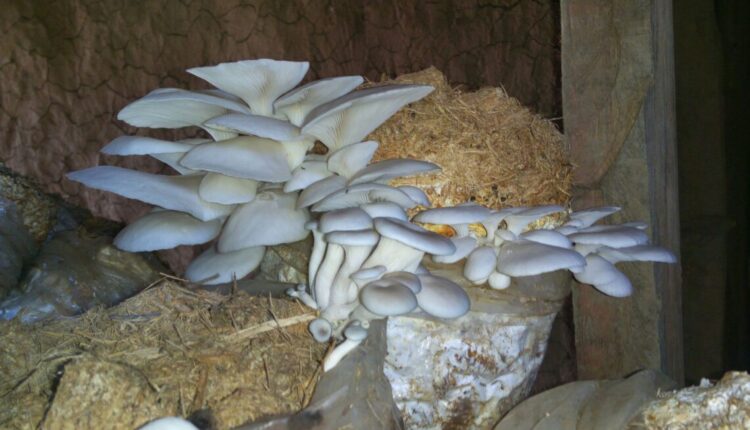
Button Mushroom
Temperature and Climate: Cool climate is considered best for the cultivation of button mushroom. The temperature of 22 to 25 degree celsius and 80 to 85 percent moisture is required for good yield of this variety. The season from October to March is most favourable for mushroom cultivation. Two yields of button mushroom can be obtained in these 6 months. It has a crop cycle of 6 to 8 weeks.
Cost and profit: It costs about 50 thousand to make 4 to 5 quintals of compost. One and a half kilogram seeds are used per quintal. In 4 to 5 quintals, 2000 kg of button mushroom is produced. The price of button mushroom ranges from Rs 140 to 180 per kg in the market. In this way a profit of up to 2 lakhs can be earned.
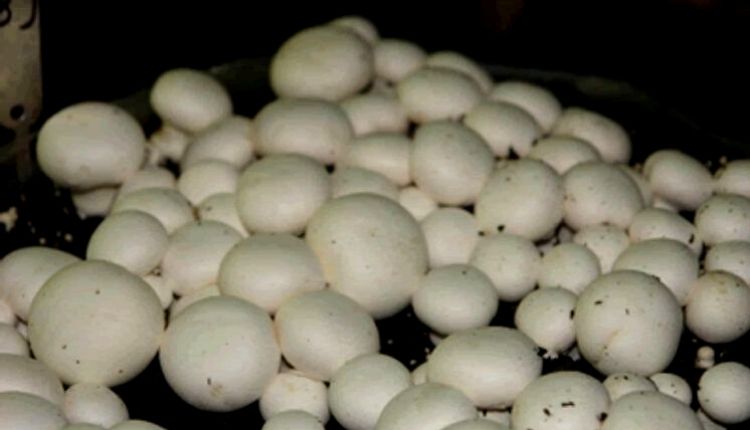
Milky Mushroom
Temperature and Climate: High temperature is considered suitable for the cultivation of milky mushroom. Except in mountainous areas, a crop of milky mushroom can be grown in almost all the plains. The temperature of 25 to 35 degree Celsius and humidity of 80 to 90 percent is suitable for its good yield. It yields even when the temperature is up to 40 degrees. March to October is the best time for cultivation of milky mushroom.
Cost and profit: One kilogram of dry straw yields one kilogram of milky mushroom. Its production cost is 20 to 25 rupees per kg. The price of milky mushroom ranges from Rs 100 to 200 per kg in the market.
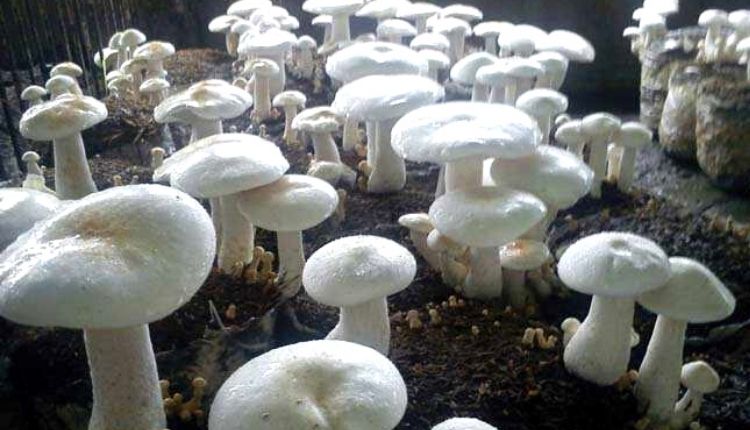
Paddy Straw Mushroom
Temperature and Climate: Pedistra mushroom is a fast growing mushroom in high temperature. Hence higher temperature is better for cultivation of this variety. An area with a temperature of 28 to 35 degrees and a humidity of 60 to 70 percent is suitable for the cultivation of pedistra mushroom. The crop of pedistra mushroom becomes ready in 20 to 25 days. Pedistra mushroom is cultivated from May to September.
Cost and profit: About 12 to 15 kg of pedistra mushroom can be prepared from 100 kg of straw. The price of pedistra mushroom is around Rs 360 per kg in the market.
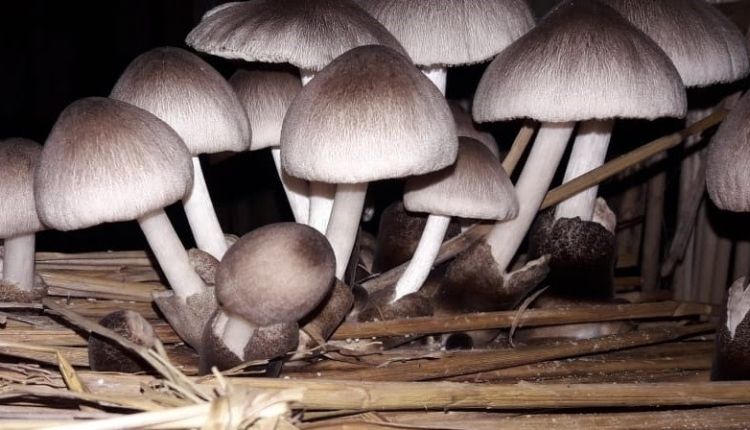
Also Read:
Shiitake Mushroom
Temperature and climate : This variety of mushroom comes second in terms of production in the world. Its crop can be taken 3 times in a year. Its crop is ready in one to two months. It requires initial temperature of 22 to 27 degree Celsius while sowing. Then it is necessary to keep the temperature of 15 to 20 degrees during the germination of the crop.
Cost and Profit : A room of size 10x10x10ft can yield 160-200 kg of mushroom in one crop rotation. It costs 10 to 15 rupees per kg. Fresh shiitake mushrooms are sold in the market at very expensive rates. The price of shiitake mushroom ranges from 2 thousand to 5 thousand rupees per kg.
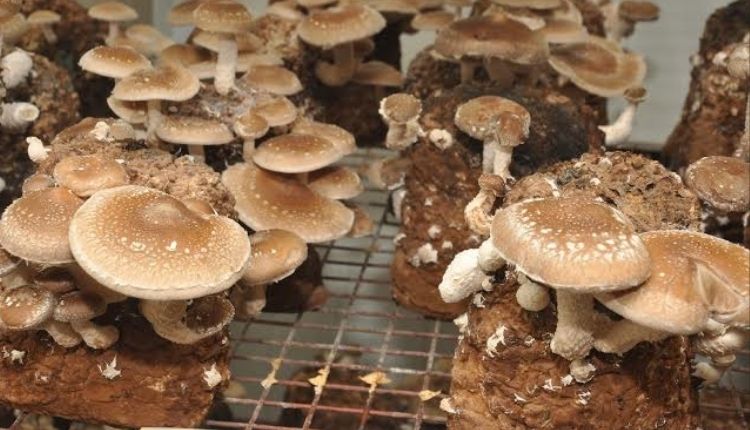
Mushroom papads, protein supplement powder, pickles, biscuits, cookies, noodles, jams, sauces, soups, chips, sev and many more products are made. Mushroom papad Rs.300 per kg, Mushroom powder Rs.500 to 1000 per kg, Mushroom pickle of 200 grams cost around Rs 300, 700 ml bottle of mushroom sauce Rs 300 to 400, Mushroom chips at Rs 1099 per kg are sold in the market.
You can take training from here
The government is also promoting mushroom production through several schemes. For mushroom cultivation, farmers can take training in their nearest Krishi Vigyan Kendra or Agricultural University. Not only this, online training on mushroom cultivation is also being given by ICAR-Directorate of Mushroom Research, whose complete information you can see by visiting this link dmrsolan.icar.gov.in.
Contact us: If farmers want to share information or experiences related to farming with us, then they can do this by calling us on the phone number 9599273766 or by writing an email to [email protected] or by sending your recording. Through Kisan of India, we will convey your message to the people, because we believe that if the farmers are advanced then the country is happy.



